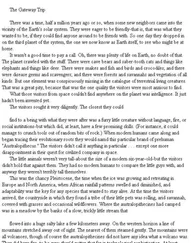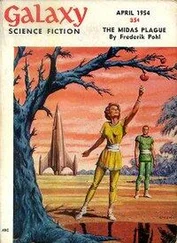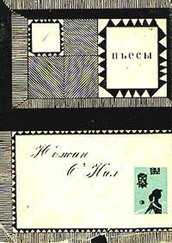Pohl, Frederik - Beyond the Blue Event Horizon
Здесь есть возможность читать онлайн «Pohl, Frederik - Beyond the Blue Event Horizon» весь текст электронной книги совершенно бесплатно (целиком полную версию без сокращений). В некоторых случаях можно слушать аудио, скачать через торрент в формате fb2 и присутствует краткое содержание. Жанр: Старинная литература, на английском языке. Описание произведения, (предисловие) а так же отзывы посетителей доступны на портале библиотеки ЛибКат.
- Название:Beyond the Blue Event Horizon
- Автор:
- Жанр:
- Год:неизвестен
- ISBN:нет данных
- Рейтинг книги:4 / 5. Голосов: 1
-
Избранное:Добавить в избранное
- Отзывы:
-
Ваша оценка:
- 80
- 1
- 2
- 3
- 4
- 5
Beyond the Blue Event Horizon: краткое содержание, описание и аннотация
Предлагаем к чтению аннотацию, описание, краткое содержание или предисловие (зависит от того, что написал сам автор книги «Beyond the Blue Event Horizon»). Если вы не нашли необходимую информацию о книге — напишите в комментариях, мы постараемся отыскать её.
Beyond the Blue Event Horizon — читать онлайн бесплатно полную книгу (весь текст) целиком
Ниже представлен текст книги, разбитый по страницам. Система сохранения места последней прочитанной страницы, позволяет с удобством читать онлайн бесплатно книгу «Beyond the Blue Event Horizon», без необходимости каждый раз заново искать на чём Вы остановились. Поставьте закладку, и сможете в любой момент перейти на страницу, на которой закончили чтение.
Интервал:
Закладка:
The Food Factory had been the size of a skyscraper, but this was a world. Perhaps, like Gateway, it had once been an asteroid; but, if so, it had been so tooled and sculpted that there was no trace of original structure. It was cubic kilometers of mass. It was a rotating mountain. So much to explore! So much to learn!
And so much to fear. They skulked, or strutted, through the old halls, and Lurvy realized she was clinging to her husband’s hand. And Paul was clinging back. She forced herself to observe and comment. The sides of the walls were veined with luminous tracing of scarlet; the overhead was the familiar blue Heecheemetal glow. On the floor-and it was really a floor; they had weight here, though not more than a tenth of Earth-normal- diamond-shaped mounds contained what looked like soil and grew plants. “Berryfruit,” said Wan proudly over his shoulder, shrugging toward a waist-high bush with fuzzed objects hanging among its emerald leaves. “We can stop and eat some if you like.”
“Not right now,” said Lurvy. A dozen paces farther along the corridor was another planted lozenge, this one with slate-green tendrils and soft, squashed cauliflower-shaped buds. “What’s that?”
He paused and looked at her. It was clear he thought it was a silly question. “They are not good to eat,” he shrilled scornfully. “Try the berryfruit. They are quite tasty.”
So the party paused, where two of the red-lined corridors came together and one of them changed to blue. They peeled brown-green furry skins from the berryfruit and nibbled at the juicy insides-first tentatively, then with pleasure-while Wan explained the geography of Heechee Heaven. These were the red sections, and they were the best to be in. There was food here, and good places to sleep; and the ship was here, and here the Old Ones never came. But didn’t they sometimes wander out of their usual places to pick the berryfruit? Yes, of course they did! But never (his voice rising half an octave) here. It had never happened. Over there the blue. His voice sank, in volume as well as pitch. The Old Ones came there quite often, or to some parts of the blue. But it was all dead. If it were not that the Dead Men’s room was in the blue he would never go there. And Lurvy, peering down the corridor he pointed to, felt a chill of incredible age. It had the look of a Stonehenge or Gizeh or Angkor Wat. Even the ceilings were dimmer, and the plantings there were sparse and puny. The green, he went on, was all very well, but it was not working properly. The water jets did not function. The plantings died. And the gold—
His pleasure faded when he talked about the gold. That was where the Old Ones lived. If it were not for needing books, and sometimes clothes, he would never go to the gold, though the Dead Men were always urging him to. He did not want to see the Old Ones.
Paul cleared his throat to say: “But I think we have to do that, Wan.”
“Why?” the boy shrilled. “They are not interesting!”
Lurvy put her hand on his arm. “What’s the matter, Wan?” she asked kindly, observing his expression. What Wan felt always showed on his face. He had never had the need to develop the skills of dissembling.
“He looks scared,” Paul commented.
“He is not scared!” Wan retorted. “You do not understand this place! it is not interesting to go to the gold!”
“Wan, dear,” Lurvy said, “the thing is, it’s worth taking chances to find out more about the Heechee. I don’t know if I can explain what it means to us, but the least part of it is that we would get money for it. A lot of money.”
“He doesn’t know what money is,” Paul interrupted impatiently. “Wan. Pay attention. We are going to do this. Tell us how the four of us can safely explore the gold corridors.”
“The four of us can not! One person can. I can,” he boasted. He was angry now, and showed it. Paul! Wan’s feelings about him were mixed, but most of the mixture were unfavorable. Speaking to Wan, Paul shaped his words so carefully-so contemptuously. As though he did not think Wan were smart enough to understand. When Wan and Janine were together, Paul was always near. If Paul was a sample of human males, Wan was not proud to be one. “I have gone to the gold many times,” he boasted, “for books, or for berryfruit, or just to watch the silly things they do. They are so funny! But they are not entirely stupid, you know. I can go there safely. One person can. Perhaps two people can, but if we all go they will surely see us.”
“And then?” Lurvy asked.
Wan shrugged defensively. He didn’t really know the answer to that, only that it had frightened his father. “They are not interesting,” he repeated, contradicting himself.
Janine licked her fingers and tossed the empty berryfruit skins to the base of the bush. “You people,” she sighed, “are unreal. Wan? Where do these Old Ones come?”
“To the edge of the gold, always. Sometimes into the blue or the green.”
“Well, if they like these berryfruits, and if you know a place where they come to pick them, why don’t we just leave a camera there? We can see them. They can’t see us.”
Wan shrilled triumphantly, “Of course! You see, Lurvy, it is not necessary to go there! Janine is right, only-“ he hesitated- “Janine? What is a camera?”
As they went, Lurvy had to nerve herself to pass every intersection, could not help staring down each corridor. But they heard nothing, and saw nothing that moved. It was as quiet as the Food Factory when they first set foot in it, and just as queer. Queerer. The traceries of light on every wall, the patches of growing things-above all, the terrifying thought that there were Heechee alive somewhere near. When they had dropped off a camera by a berryfruit bush in a space where green, blue, and gold came together, Wan bustled them away, directly to the room where the Dead Men lived. That was first priority: to get to the radio that would once again put them in touch with the rest of the world. Even if the rest of the world was only old Payter, fidgeting resentfully around the Food Factory. If they could not do that much, Lurvy reasoned, they had no business being here at all, and they should return to the ship and head for home; it was no good exploring if they could not report what they found!
So Wan, courage returning in direct proportion to his increasing distance from the Old Ones, marched them through a stretch of green, up several levels in blue, to a wide blue door. “Let us see if it is working right,” he said importantly, and stepped on a ridge of metal before the door. The door hesitated, sighed and then creakily opened for them, and, satisfied, Wan led them inside.
This place at least seemed human. If strange. It even smelled human, no doubt because Wan had spent so much time there over his short life. Lurvy took one of the minicameras from Paul and settled it on her shoulder. The little machine hissed tape past its lens, recording an octagonal chamber with three of the forked Heechee seats, two of them broken, and a stained wall bearing the Heechee version of instrumentation-ridges of colored lights. There was a tiny sound of clicks and hums, barely perceptible, behind the wall. Wan waved at it “In there,” he said, “is where the Dead Men live. If ‘live’ is the right word for what they do.” He tittered.
Lurvy pointed the camera at the seats and the knurled knobs before them, then at a domed, clawed object under the smeared wall. It stood chest high, and it was mounted on soft, squashed cylinders to roll on. “What’s that, Wan?”
“It is what the Dead Men catch me with sometimes,” he muttered. “They don’t use it very often. it is very old. When it breaks, it takes forever to mend itself.”
Paul eyed the machine warily, and moved away from it. “Turn on your friends, Wan,” he ordered.
Читать дальшеИнтервал:
Закладка:
Похожие книги на «Beyond the Blue Event Horizon»
Представляем Вашему вниманию похожие книги на «Beyond the Blue Event Horizon» списком для выбора. Мы отобрали схожую по названию и смыслу литературу в надежде предоставить читателям больше вариантов отыскать новые, интересные, ещё непрочитанные произведения.
Обсуждение, отзывы о книге «Beyond the Blue Event Horizon» и просто собственные мнения читателей. Оставьте ваши комментарии, напишите, что Вы думаете о произведении, его смысле или главных героях. Укажите что конкретно понравилось, а что нет, и почему Вы так считаете.












